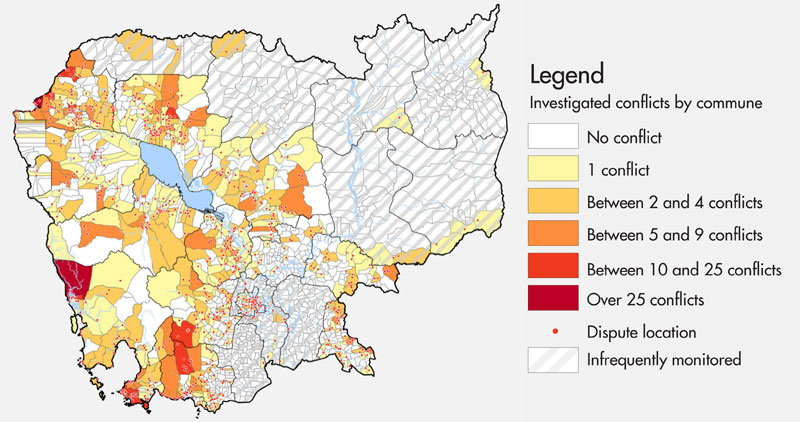Land conflicts across the country are rising again, following an election-year lull, according to rights group Licadho.
Conflicts continue unabated despite the government’s freeze on new economic land concessions and its push to issue more land titles, Licadho said.

In the 13 provinces the NGO monitors, a “renewed wave” of land grabbing has affected more than 2,200 new families from January through March, nearly four times the 618 families newly caught up in similar land disputes during the same period last year, Licadho said Tuesday.
The latest disputes brought to just over 500,000 the number of Cambodians caught in land conflicts in the 13 provinces recorded by Licadho since 2000.
Licadho director Naly Pilorge called the figure a “shameful milestone.”
“Each number represents a potentially ruined life, an individual who faces severe and long-term hardship,” she said. “Without land, they no longer have the means to provide themselves with the basic requirements for a decent life. The government must act now to end this epidemic of land grabbing.”
The reported rise in land conflict comes despite a freeze on new economic land concessions that Prime Minister Hun Sen ordered in mid-2012 amid mounting criticism of rampant forced evictions and illegal logging. At the same time, the prime minister ordered a legal review of all existing concessions. He threatened to revoke licenses for those caught breaking the rules, and promised a nationwide drive to furnish private citizens with land titles.
Since then, the government has handed out 450,000 new titles.
Licadho recorded a drop in the number of families newly affected by land conflicts in the 13 provinces from 2012 to 2013, but also a rise in total cases. It says the land-titling push has bypassed state institutions legally charged with doing the work. It also claims that the government refuses to make public the new rules being used, or to let NGOs monitor the titling project.
As for the review of existing concessions, the government has canceled a few licenses. In late 2012, then-Agriculture Minister Chan Sarun said the review hadn’t even started yet for fear that rain and leeches would hamper fieldwork.
“It is clear that the government’s directive has not fully taken effect, as there is no evidence that any effective review of existing land concessions has taken place,” Licadho said in its statement. “The failure to carry out the review is particularly egregious given the government’s recent announcement that it will resell previously granted concessions that have not been put to use.”
Last month, at a rubber industry summit, Ly Phalla, who heads the Agriculture Ministry’s general directorate of rubber, proposed recycling idle concessions to new investors. But with the system to grant new concessions still broken and the government review still pending, rights groups say the investment pitch is premature and that recycling old concessions risks perpetuating old problems.
Neither Bin Chhin, who chairs the government’s National Authority for Land Dispute Resolution, nor Beng Hong Socheat Khemro, spokesman for the Land Management Ministry, could be reached for comment.
At the Ministry of Agriculture, which is handling the bulk of the ELC review, former spokesman Thun Sarath referred questions to Eang Sophalleth. He could not be reached.
(Additional reporting by Kuch Naren)




